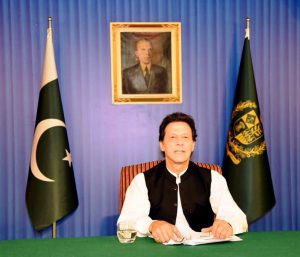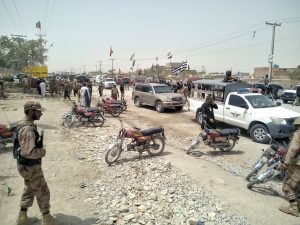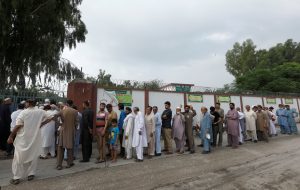
By Phil Stewart
ISLAMABAD (Reuters) – U.S. Secretary of State Mike Pompeo met new Pakistani Prime Minister Imran Khan on Wednesday, saying he was hopeful of “a reset of relations” long strained over the war in Afghanistan.
Pompeo’s visit, along with the U.S. chairman of the joint chiefs of staff, was the first high-level U.S. mission to the new government. It aimed to smooth over tensions after President Donald Trump took a tough new line towards Pakistan over longstanding accusations it is not doing enough to root out Afghan Taliban fighters on its territory.
Pompeo met with Khan as well as Pakistani Foreign Minister Shah Mehmood Qureshi and the country’s powerful army chief, General Qamar Javed Bajwa.
“We talked about their new government, the opportunity to reset the relationship between our two countries across a broad spectrum,” including business ties and ending the war in Afghanistan, Pompeo told reporters before leaving for India.
“And I’m hopeful that the foundation that we laid today will set the conditions for continued success as we start to move forward.”
Khan, a former cricket star who swept to power in the July elections, also struck a positive tone.
“I’m a born optimist. A sportsman always is an optimist. He steps on the field and he thinks he’s going to win,” Khan told reporters.

FILE PHOTO: Pakistan’s Prime Minister Imran Khan, speaks to the nation in his first televised address in Islamabad, Pakistan August 19, 2018. Press Information Department (PID)/Handout via REUTERS
AID CUTS
Pompeo expressed confidence in a new beginning in relations with nuclear-armed Pakistan, but conceded: “We’ve still got a long way to go.”
“We made clear to them that – and they agreed – it’s time for us to begin to deliver on our joint commitments,” Pompeo said, without specifically mentioning the Taliban.
The meetings come against a backdrop of tense ties and U.S. military aid cuts over Islamabad’s alleged reluctance to crack down on militants.
Washington has accused Islamabad of turning a blind eye to, or helping, Afghan Taliban and Haqqani network fighters who stage attacks in Afghanistan. Pakistan denies doing so.
Pompeo landed in Islamabad minutes after the plane carrying U.S. Marine General Joseph Dunford, chairman of the Joint Chiefs of Staff.
Ahead of the talks, Dunford said Trump’s South Asia strategy set clear expectations for Pakistan, including help to drive the Taliban to a peace process in neighboring Afghanistan.
“Our bilateral relationship moving forward is very much going to be informed by the degree of cooperation we see from Pakistan in doing that,” he told reporters.
The United States has withheld $800 million in overall assistance this year, cuts Pakistan says are unwarranted as it incurs expenses in fighting militants who threaten U.S. troops in Afghanistan.
Pompeo was also expected to discuss Pakistan’s possible plans to seek a bailout from the International Monetary Fund (IMF) to ease currency pressures and avert an economic crisis.
In July, Pompeo said there was “no rationale” for the IMF to give money to Pakistan that would then be used to pay off Chinese loans, comments that further rattled Islamabad.
INDIA NEXT
Pompeo is next due to visit India, Pakistan’s neighbor and bitter foe, where he is expected to put pressure on New Delhi over its purchases of Iranian oil and Russian missile systems.
He and Defense Secretary Jim Mattis will meet their Indian counterparts in New Delhi on Thursday and are expected to finalize defense pacts that could bring their militaries closer amid growing Chinese influence across Asia.
The talks come as U.S. hostility rises towards India’s traditional allies Iran and Russia, targets of U.S. sanctions. Iran is a big oil supplier to India, and two-thirds of its military equipment is from Russia.
The United States is concerned about India’s planned purchase of S-400 surface-to-air missile systems from Moscow.
An Indian defense ministry official said the country had nearly concluded commercial negotiations with Russia for the systems and intended to proceed with them, to boost defenses against China.
India has said it will not completely halt oil imports from Iran, but will finalize its strategy on crude purchases after this week’s meeting with U.S. officials.
(Additional reporting by Drazen Jorgic in Islamabad and Krishna Das in India; Writing by Drazen Jorgic and Kay Johnson; Editing by Andrew Roche)










